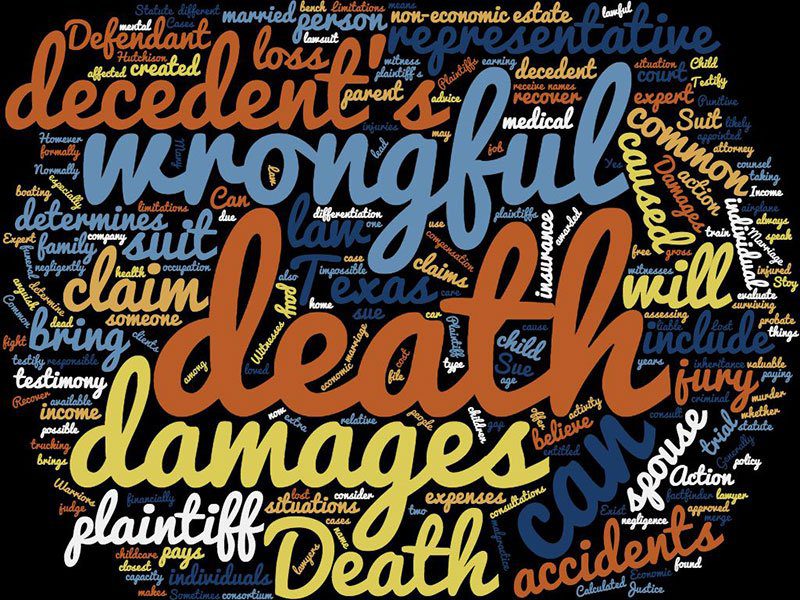A wrongful death claim is a cause of action. When the plaintiff brings a lawful death claim against the defendant the plaintiff claims that the defendant caused the death of a loved one. Many different situations could lead to a wrongful death claim. These include car accidents, train accidents, boating accidents, trucking accidents, airplane accidents, criminal activity (such as murder), and medical malpractice.
Who pays in a Wrongful Death Suit?
If the Defendant is found liable in a wrongful death suit, the Defendant will be responsible for paying damages. Normally the defendant pays damages to the decedent’s estate.
If the Defendant has an insurance policy, the insurance company will most likely pay the damages in the wrongful death claim.
What Damages can a Plaintiff Recover in a Wrongful Death Action?
A plaintiff can recover economic damages and non-economic damages in wrongful death cases.
Economic damages include medical expenses, lost income/ earning capacity, loss of inheritance, and funeral expenses.
Plaintiffs can also recover for non-economic damages, which include loss of consortium, loss of advice and counsel, mental anguish.
Punitive damages may be available in situations where the defendant caused the decedent’s death due to gross negligence.
How are Damages for Lost Income in Wrongful Death Cases Calculated?
The factfinder determines what damages the plaintiff is entitled to in a wrongful death action. This means that the jury determines damages in a jury trial and that the judge determines damages in a bench trial.
When the jury is assessing what damages the plaintiff should be awarded for loss income, the jury will consider the decedent’s age, the decedent’s health, and the decedent’s occupation, among other things.
Can Expert Witnesses Testify in a Wrongful Death Suit?
Sometimes plaintiff’s use expert witnesses testimony to evaluate how the death of the decedent affected the decedent’s family financially.
This type of testimony is especially valuable when the decedent did not have a job, but they were taking care of children at home. In this situation, the family now has to pay for childcare, and an expert witness can testify about this extra cost.
Can I Sue for Wrongful Death of a Child?
Yes, in Texas plaintiffs can sue for the wrongful death of a parent, child or spouse.
What if I am in a Common Law Marriage?
In Texas, individuals can sue for the wrongful death of their spouse.
Texas law makes no differentiation between people who were formally married or individuals who were common law married.
If you believe that you were in a common law marriage you should speak to an attorney to determine whether it is possible for you to file suit against the individual who caused the death of your common law spouse.
Why does the Wrongful Death Action Exist?
The wrongful death suit was created to merge the gap that was created at common law. It is impossible for a dead person to bring a lawsuit against the person who negligently caused their death. However, someone can always bring a suit against a defendant if the defendant injured them.
Who can Sue for Wrongful Death?
The personal representative of the decedent’s estate can bring a wrongful death claim.
If the decedent’s will names a personal representative and that person is approved by the court then this individual can bring a wrongful death suit. If the will does not name a personal representative, a personal representative can be appointed by the probate court.
Generally, the personal representative will be the decedent’s closest surviving relative. This could include a spouse, a child, or a parent.
What is the Statute of Limitations for Wrongful Death in Texas?
The statute of limitations for wrongful death claims is two years in Texas.
The lawyers at Stoy Law Group offer free case consultations. If you believe that you have a claim against someone for wrongful death you should consult with a lawyer. The Warriors For Justice fight for their clients to receive compensation for their injuries.














